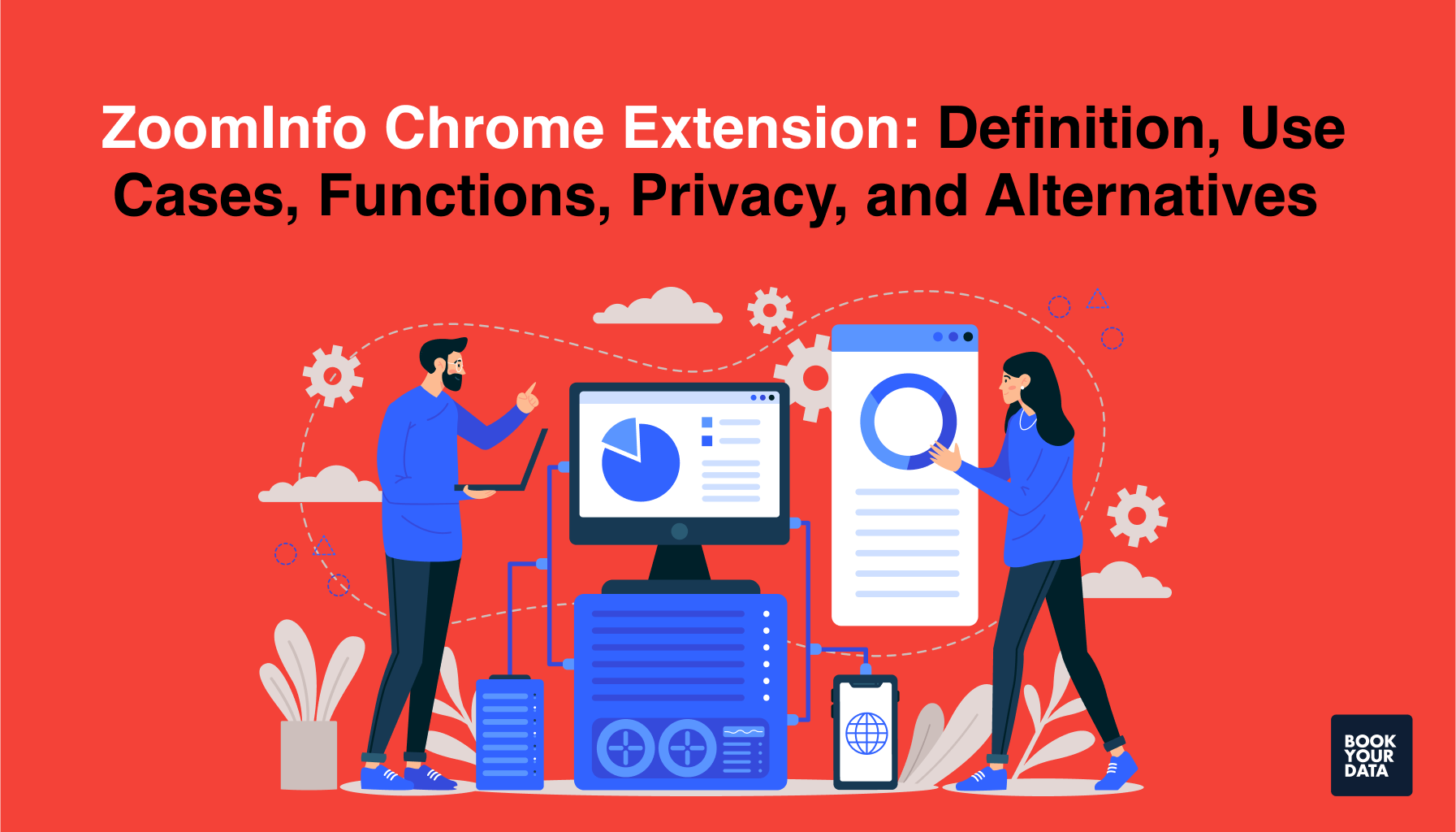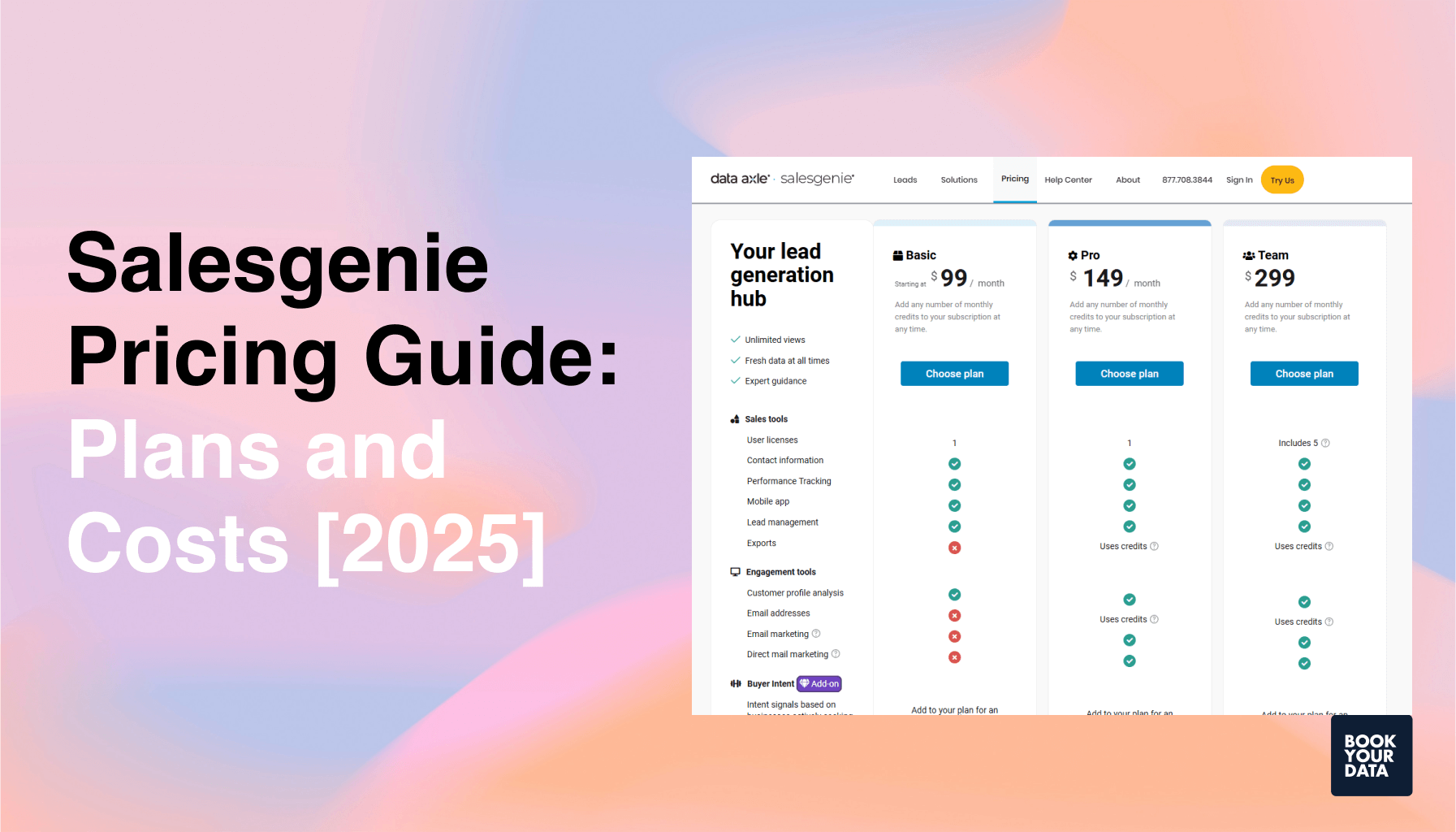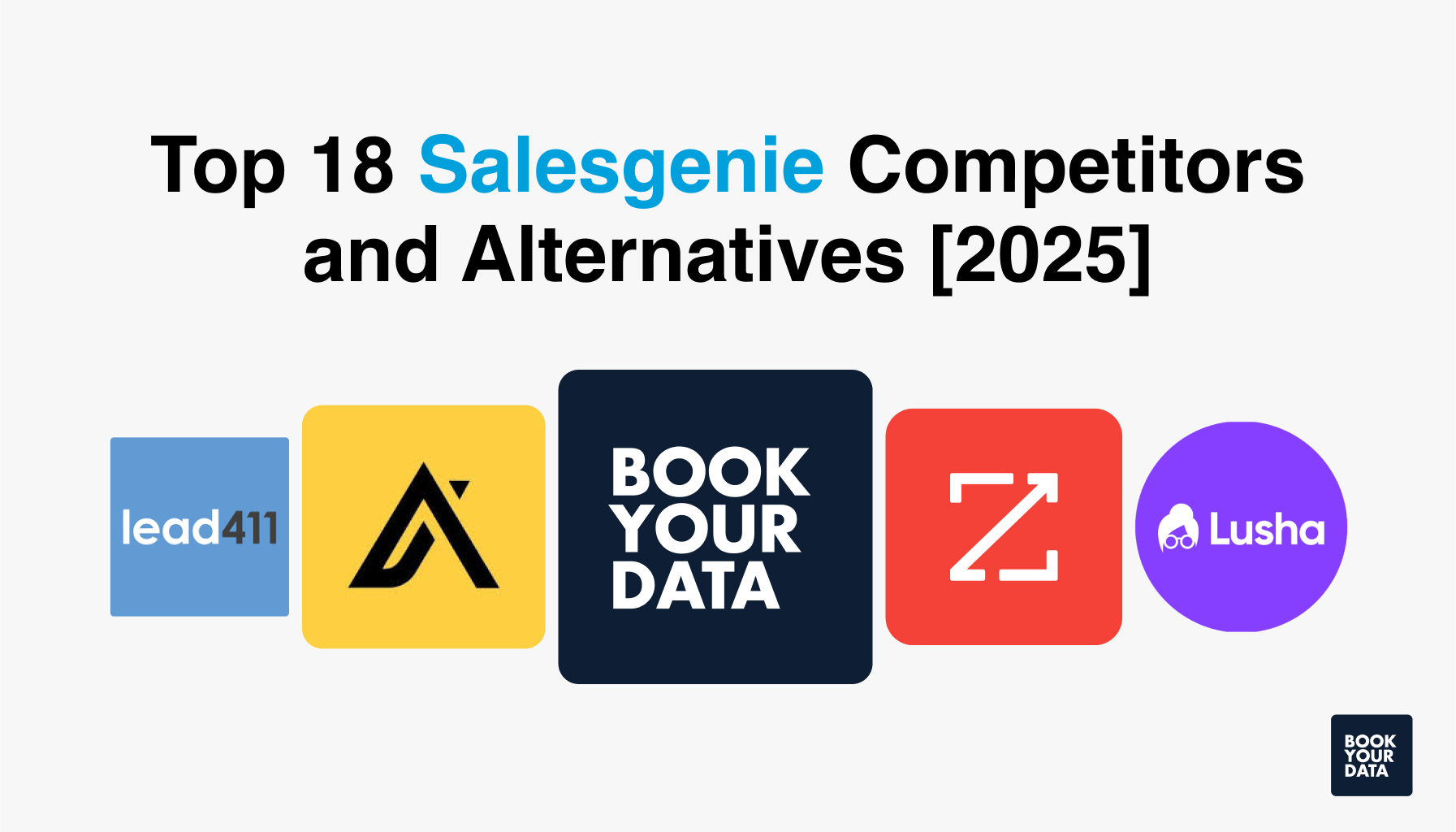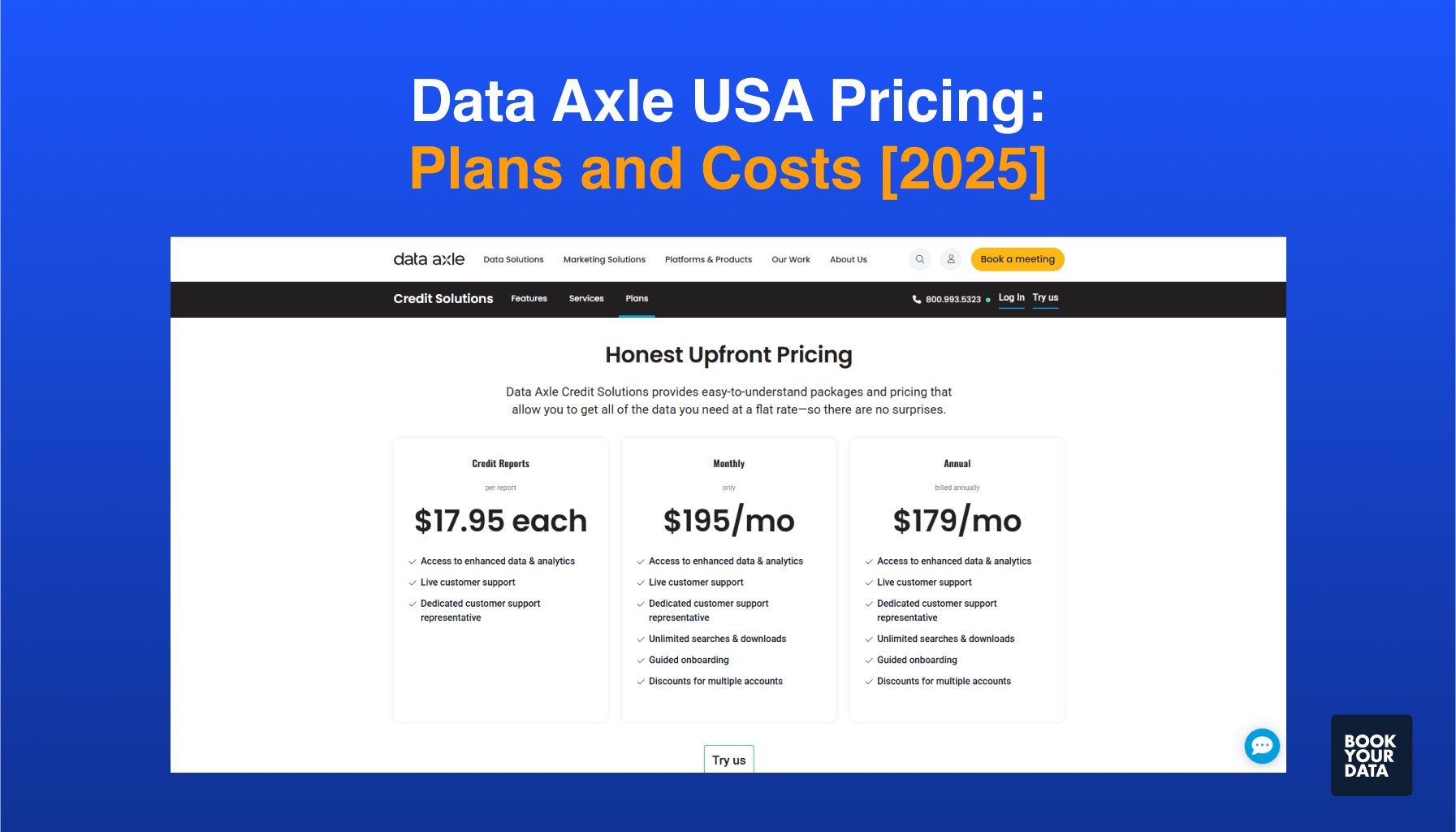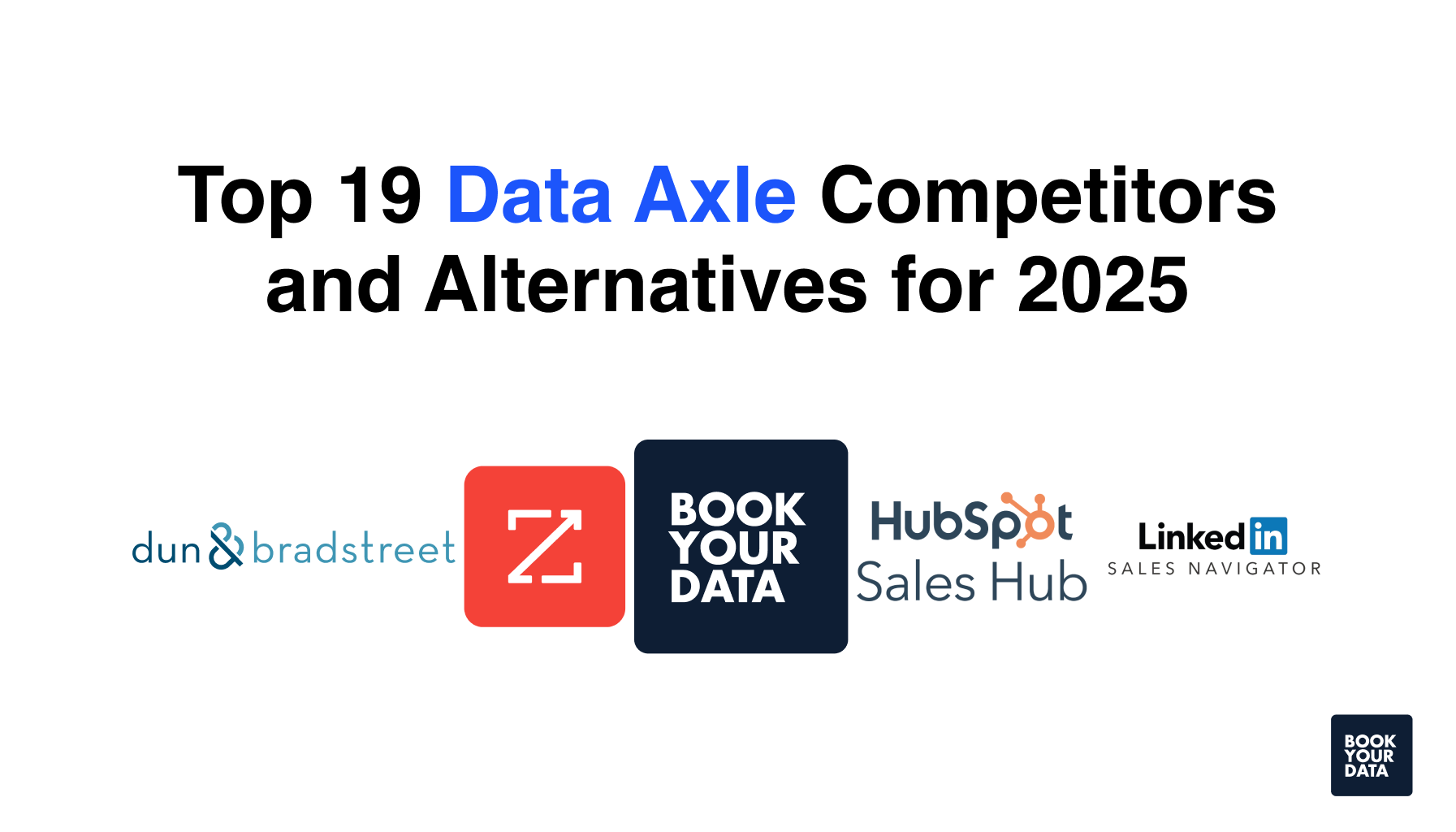ZoomInfo vs Salesgenie: Definitions, Features, Similarities, and Differences
ZoomInfo and Salesgenie are two sales intelligence platforms that support businesses in generating leads, enriching marketing campaigns, and improving prospecting. ZoomInfo is a sales intelligence platform that provides a large-scale B2B database of global company profiles and professional contacts, firmographic and technographic insights, intent signals, and predictive analytics that help sales and marketing teams find new opportunities and build sales pipelines.
Salesgenie offers easy-to-use targeted databases for both businesses and consumers. It allows users to filter leads by demographics, industry, business size, location, or lifestyle, which creates accurate prospect lists.
ZoomInfo and Salesgenie share similarities that include connecting organizations with the right audience through reliable, up-to-date data, automating lead access, providing segmentation filters, integrating with CRMs, and continuously updating records to reduce bounce rates and improve outreach efficiency.
Both sales intelligence platforms have key differences in scope and audience. ZoomInfo serves large enterprises that require advanced analytics, AI-driven insights, and large-scale prospecting worldwide. Salesgenie serves small and mid-sized businesses that need straightforward, cost-effective lead generation and campaign management, with flexible monthly billing, unlike ZoomInfo’s higher-cost annual subscriptions.
ZoomInfo vs Salesgenie comparison
The table below compares different categories of ZoomInfo and Salesgenie for a better understanding of their key features, such as data coverage and accuracy, pricing models, integrations, AI support, and outreach tools.
What is ZoomInfo?

ZoomInfo is an AI-powered GTM (Go-to-Market) intelligence platform that provides businesses with comprehensive access to global B2B contact and company data. It combines a vast database of more than 235 million professionals and 100 million company profiles with advanced sales, marketing, and recruitment tools.
ZoomInfo helps organizations identify, connect, and convert high-value prospects through firmographic, technographic, and intent data with workflow automation and integrations with popular CRMs and marketing systems.
ZoomInfo Technologies provides data-driven insights to help businesses find their target audience. It delivers verified and updated contact details and also provides intent signals that help businesses reach decision-makers at the right buying stage. It increases a business’s efficiency with automated outreach, engagement tracking, and integration with enterprise systems.
How does ZoomInfo work?
ZoomInfo works by gathering data from multiple sources, which include public records, corporate websites, and professional networking platforms, to compile it into an updated database of companies and professionals. ZoomInfo collects large amounts of business data from AI and human research. Third-party providers and community contributors source company updates, executive changes, and contact information, while a dedicated team of researchers validates and refines these entries.
What is Salesgenie?
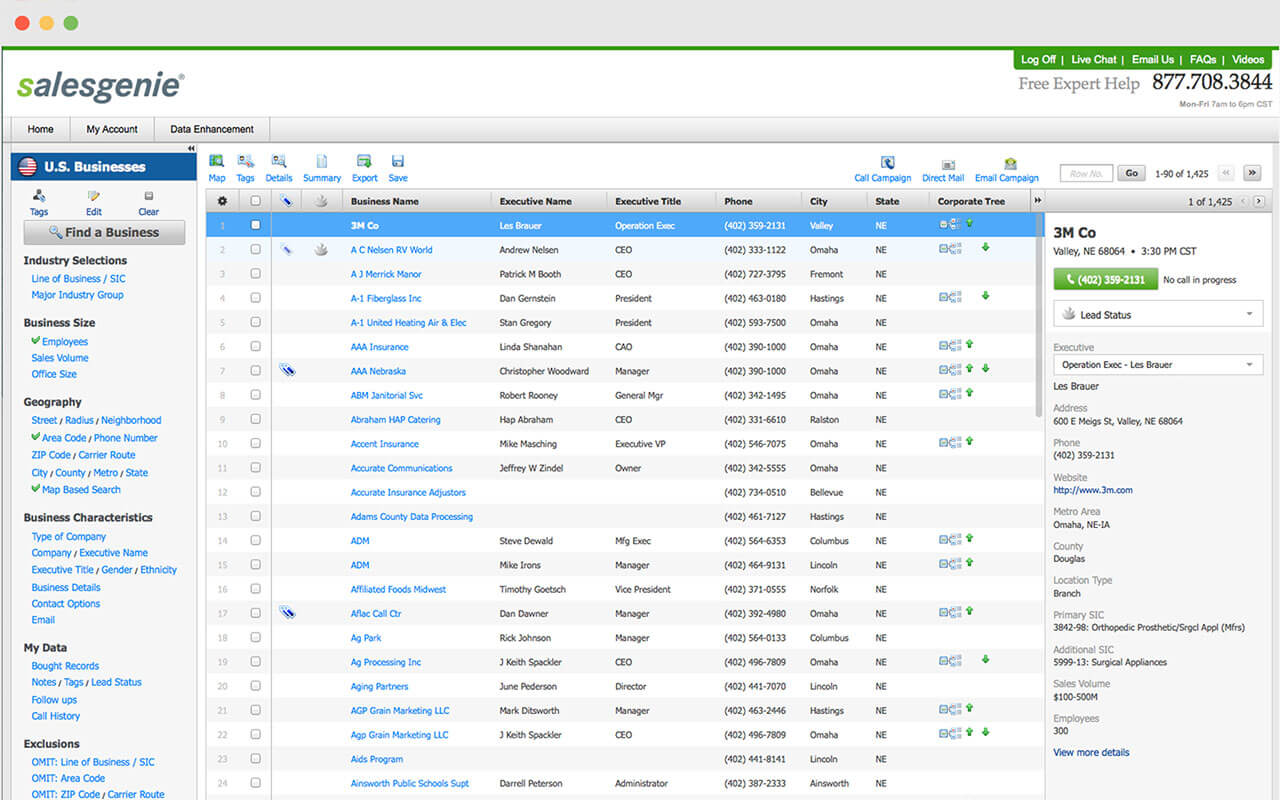
Salesgenie is a lead generation and marketing platform that provides businesses with access to an extensive business and consumer database. Salesgenie helps companies connect with other businesses and with individual consumers. This is valuable for organizations that target both business and consumer markets simultaneously.
The business intelligence platform allows sales teams, marketers, and business development professionals to find, connect, and retain customers. Salesgenie supports prospecting, direct outreach, and customer engagement across multiple channels through powerful search filters, integrated marketing tools, and multichannel marketing.
Salesgenie’s database covers business data, which includes industry type, company size, revenue, decision-maker contacts, and professional email addresses. It also covers consumer data such as demographics, household income, age brackets, and lifestyle interests.
How does Salesgenie work?
Salesgenie works by combining a vast database of business and consumer records with tools that allow users to filter, segment, and utilize the information through sales and marketing campaigns. It simplifies the process of finding leads and reaching out to them, which makes it useful for businesses that need a practical, actionable solution. The Salesgenie database comprises more than 25 million business contacts and over 255 million consumer contacts.
What are the features of ZoomInfo?
The features of ZoomInfo include a comprehensive B2B database, ZoomInfo Copilot, advanced search filters, buyer intent data, ZoomInfo Chorus, CRM integrations, web-form optimization, and data enrichment.
The features of ZoomInfo are listed below.
- Comprehensive B2B database: ZoomInfo maintains a large collection of business information, which includes professional contact details, updated company profiles, and verified industry data to help sales teams find potential leads and engage with them.
- ZoomInfo Copilot: ZoomInfo Copilot combines ZoomInfo’s extensive B2B database with AI-driven insights, generative content, and real-time signals. This Copilot helps GTM teams quickly identify decision-makers, prioritize accounts most likely to buy, and generate personalized outreach in seconds.
- Advanced search filters: ZoomInfo gives users advanced filtering tools by industry, geography, job title, seniority, and company size. This allows businesses to build focused prospecting lists and target leads that match their Ideal Customer Profile (ICP) precisely.
- Buyer intent data: ZoomInfo provides buyer intent data through SalesOS, and it is collected from millions of content consumption events across publishers, websites, and research platforms. AI then analyzes these signals to uncover companies showing spikes in activity around relevant topics to allow users to prioritize the accounts most likely to convert.
- ZoomInfo Chorus: ZoomInfo provides its Chorus tool, which records and transcribes sales conversations in real time, then uses AI to extract insights like topics discussed, objections raised, competitor mentions, and next steps.
- CRM Integration: ZoomInfo integrates directly with popular CRMs and marketing tools like Salesforce, HubSpot, and Microsoft Dynamics, which keeps contact and company records synchronized and prevents duplication to make sure team workflows use the most current data.
- Data enrichment: The B2B intelligence system automatically updates existing customer and prospect records to fill in missing fields and correct outdated data. This helps to maintain data hygiene, reduce wasted outreach, and improve campaign ROI (Return On Investment), which allows customer information to be complete and actionable.
- Reporting & dashboards: The business intelligence platform offers dashboards, exportable reports, and analytics so teams can monitor campaign performance, credit usage, lead generation effectiveness, and the contact database, which supports data-driven decisions.
- Web-form optimization: ZoomInfo collects a website visitor’s business email through forms and uses FormComplete to automatically fill in the remaining information. ZoomInfo’s lead capture software adds incoming leads’ important data points within its technology stack for them to segment, score, and take action.
- Compliance and privacy: ZoomInfo complies with regulations such as GDPR and CCPA and follows ethical data sourcing practices to protect the data of platform users and prospects, which helps businesses avoid legal risk and builds trust.
What are the features of Salesgenie?
The features of Salesgenie include unlimited access to leads, data verification, intent filters, custom fields, lead management, email, free customer profile analysis, and marketing tools to help businesses acquire, manage, and retain customers.
The main features of Salesgenie are listed below.
- Unlimited access to business and consumer leads: Salesgenie provides access to millions of business leads and consumer records, which helps business teams search by location, industry, income, ZIP code, and age. This large database helps companies with both B2B and B2C audiences to reach a wide range of prospects.
- Intent filters: Salesgenie provides buyer intent data to help users identify and prioritize potential business buyers early. It allows users to integrate this data with their records to customize marketing and sales efforts. It also allows users to use filters like SIC codes to reduce false positives from shared IPs or high-traffic locations.
- Saved Searches: The Saved Searches feature allows snapshots of filter combinations for later use, which helps users segment and refine without starting from scratch.
- Custom fields: Salesgenie allows users to upload their own customer lists, apply custom fields for lead segmentation, and suppress existing customers before building new lists, which allows precision and avoids duplicate marketing.
- Lead manager tools: Salesgenie allows users to tag leads, record notes, change lead status, and schedule reminders or follow-ups, which organizes the sales funnel and tracks outreach actions.
- Multi-channel marketing: This sales and marketing platform supports email, direct mail, and Salesgenie Dialer for telemarketing to reach prospects. These tools allow businesses to engage prospects across multiple channels, which increases reach and conversion potential. Users can monitor their marketing campaigns on their own or get help from Salesgenie tracking software to maximize prospecting efficiency.
- CRM integrations: Salesgenie integrates with major CRMs such as Salesforce, Microsoft Dynamics, and Hubspot, which allows users to export leads, synchronize contact data, automate workflows, and have high team performance through reduced manual work.
- Mobile app and on-the-go lead tool: Salesgenie mobile app is available for iOS and Android, which allows salespeople to access leads, map nearby prospects, add custom contacts and notes, and use saved searches from any location. This on-the-go tool supports field teams who need prospecting data while traveling.
What is the difference between the integrations of ZoomInfo and Salesgenie?
The difference between the integrations of ZoomInfo and Salesgenie is that ZoomInfo integrations focus on deep B2B CRM connectivity, while Salesgenie offers user-friendly integrations covering both B2B and B2C prospecting for small businesses.
ZoomInfo integrations
ZoomInfo offers comprehensive integration options that meet the complex needs of enterprise-level organizations. It integrates with major CRM platforms such as Salesforce, HubSpot, Microsoft Dynamics, and Zoho CRM, which allow enriched contact and company data to flow directly into pipelines and reduce manual updates. ZoomInfo also connects with marketing automation platforms like Marketo, Pardot, and Eloqua, which help teams to launch targeted campaigns powered by verified data and intent signals.
ZoomInfo’s integrations also include other sales engagement platforms, such as Outreach and SalesLoft, that allow sales representatives to run personalized sequences using ZoomInfo’s intelligence.
Salesgenie integrations
Salesgenie focuses only on CRM integrations that simplify workflows for small to medium-sized businesses. Its integrations include Salesforce, SAP, Oracle, Microsoft Dynamics 365, and Zoho CRM, which allow users to import, manage, and update Salesgenie data directly within their existing systems. The CRM integrations make sure that leads easily transfer into sales pipelines, complete with notes, tags, and status updates for better organization. Salesgenie also provides the Salesgenie Connect API, which helps developers create custom integrations or connect to in-house software.
What are the similarities between ZoomInfo and Salesgenie?
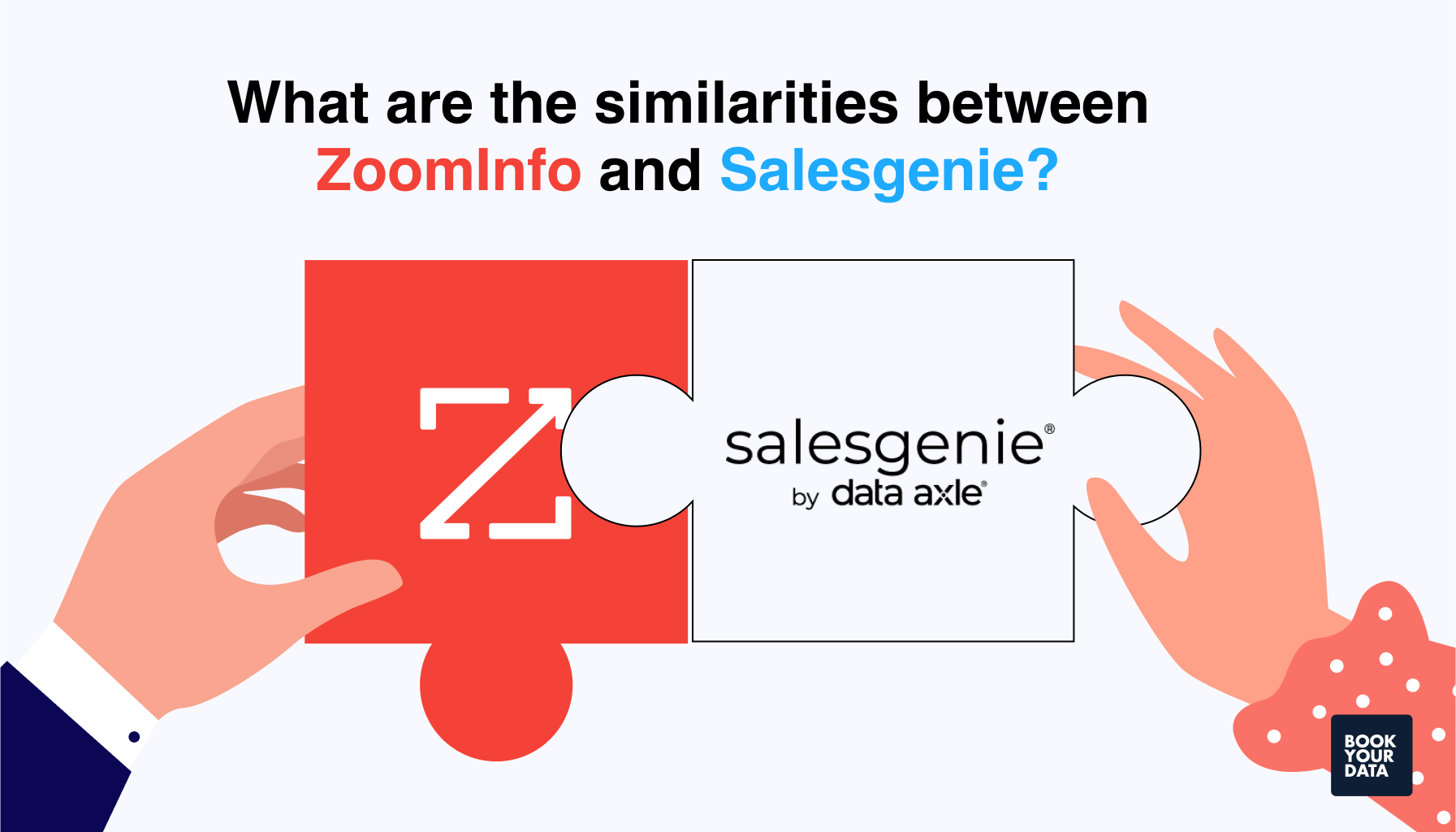
The similarities between ZoomInfo and Salesgenie include that both are sales intelligence platforms, lead generation, contact databases, list building, CRM integration, data enrichment, and search and filtering options.
The key similarities between ZoomInfo and Salesgenie are listed below.
- Sales intelligence: Both ZoomInfo and Salesgenie are leading sales intelligence platforms designed to help sales, marketing, and business development teams find, understand, and connect with potential customers. These platforms collect and organize vast amounts of business data to provide insights such as company revenue, decision-maker roles, buying intent, and market trends. ZoomInfo offers advanced AI-driven intelligence and real-time updates, while Salesgenie focuses on verified U.S. business and consumer data.
- Lead generation: ZoomInfo and Salesgenie allow users to identify and target high-quality prospects based on numerous criteria like industry, job title, location, company size, and more. ZoomInfo provides intent data and predictive scoring to help users find leads actively researching relevant topics. Salesgenie offers targeted lead lists from a comprehensive business and consumer database, including new businesses and homeowners.
- Contact databases: Both platforms maintain extensive contact databases containing millions of verified business professionals and companies. ZoomInfo provides detailed profiles of contacts, including direct phone numbers, emails, job roles, and organizational charts. Salesgenie focuses on the U.S.-based business and consumer contacts, often used for localized or small business targeting.
- List building: ZoomInfo and Salesgenie both offer powerful list-building tools that help users create segmented lead lists customized to specific business goals. Users can apply filters such as industry, revenue, employee count, job function, and geography to narrow down ideal prospects.
- CRM integration: Both platforms offer CRM integration capabilities to allow users to sync contact and company data directly with their customer relationship management systems. ZoomInfo integrates with major CRMs like Salesforce, HubSpot, and Microsoft Dynamics, while Salesgenie also integrates with platforms like Salesforce and Microsoft Dynamics.
- Data enrichment: ZoomInfo and Salesgenie provide data enrichment services that update existing customer and lead records with updated and additional information. ZoomInfo’s enrichment tool, for example, can fill in missing fields like direct dials, job titles, or company details using its massive database. Salesgenie offers similar capabilities, especially for U.S.-based records, to help businesses maintain accurate and complete data.
- Search and filtering: Both platforms feature advanced search and filtering functionalities that help users identify prospects with precision. ZoomInfo offers granular filters such as technologies used, hiring signals, department size, revenue, and intent topics. Its AI-powered search also suggests prospects based on past behavior. Salesgenie allows users to filter contacts by demographics, SIC/NAICS codes, geography, sales volume, and more.
What are the differences between ZoomInfo and Salesgenie?
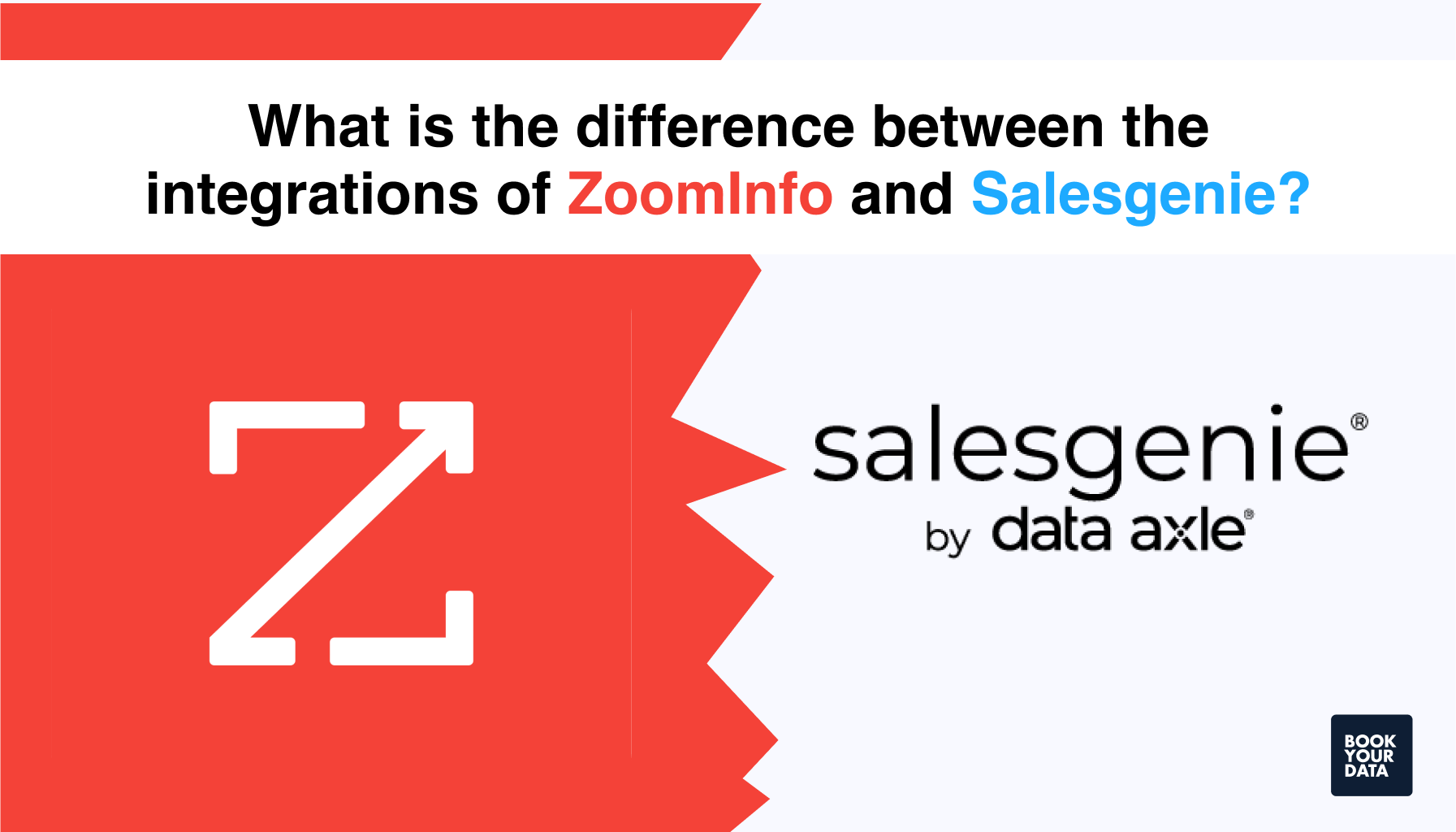
The differences between ZoomInfo and Salesgenie include their data focus, target audience, pricing, and feature sets to determine which platform is best suited for specific business needs.
The main differences between ZoomInfo and Salesgenie are listed below.
- Target audience: ZoomInfo serves enterprise-level sales and marketing teams that require advanced analytics, while Salesgenie is more suitable for small to medium-sized businesses with easy and straightforward prospecting needs.
- Data focus: ZoomInfo specializes in verified B2B company and contact data, while Salesgenie provides both B2B and consumer databases, which makes it more flexible for businesses with hybrid audiences.
- Feature set: ZoomInfo offers advanced tools such as intent data, technographics, organizational charts, and conversation intelligence. Salesgenie focuses on tools for direct mail, email campaigns, telemarketing, and consumer marketing.
- Pricing: ZoomInfo uses a customized pricing model based on business size, data needs, and platform usage. Its pricing is higher due to its advanced capabilities and enterprise-grade tools. Salesgenie offers more transparent, tiered pricing plans that are suitable for SMBs and individual users. It allows users to purchase monthly or annual plans, with options based on the number of leads or searches needed.
- Integrations: ZoomInfo integrates with a wide range of platforms, including major CRMs like Salesforce, HubSpot, and Microsoft Dynamics, as well as marketing automation systems like Marketo and sales engagement tools like Outreach and Salesloft. Salesgenie offers more limited integration capabilities, focusing primarily on CRM systems such as Salesforce.
- Data depth: ZoomInfo provides highly detailed B2B data that includes firmographics, technographic, organizational charts, hiring trends, and intent data, while Salesgenie provides broader data coverage, including both businesses and consumers, but with fewer filters.
- Ease of use: ZoomInfo requires a training period for advanced functionality, which is best handled by skilled teams, while Salesgenie offers a more user-friendly interface that allows quick list generation and campaign setup without requiring training or technical expertise.
What are the use cases of ZoomInfo?
The use cases of ZoomInfo include sales support, marketing campaigns, recruitment, and data support for strategic planning, which make it a comprehensive sales intelligence and marketing platform. Businesses rely on ZoomInfo to improve prospecting, enhance targeting, and support multiple business functions.
The use cases of Zoominfo are listed below.
- Sales support: ZoomInfo provides sales teams with verified contact data, buyer intent signals, and company insights, which help them prioritize the right accounts and shorten sales cycles with high success rates.
- Marketing campaigns: Marketing teams use ZoomInfo’s segmentation, intent data, and integrations with platforms like Marketo and HubSpot to design targeted campaigns that improve engagement and ROI (return on investment).
- Account-based marketing: ZoomInfo supports ABM (account-based marketing) with organizational hierarchies, firmographics, and intent insights, which allows teams to personalize outreach for high-value accounts of multiple stakeholders.
- Recruitment and talent sourcing: ZoomInfo’s professional data helps HR teams to identify candidates, analyze career paths, and run recruitment campaigns to reduce the hiring period and improve talent acquisition quality.
- Business intelligence: Business development representatives use ZoomInfo’s technographic and trigger data to monitor competitor technologies, leadership changes, and funding news. It helps to make better marketing strategies and improve active client engagement.
What are the use cases of Salesgenie?
The use cases of Salesgenie are sales professionals, marketing teams, small businesses and startups, and enterprises. Companies use the platform to run targeted campaigns, manage leads, and support data-driven sales decisions.
The use cases of Salesgenie are listed below.
- Sales professionals: Sales professionals and teams use Salesgenie to build targeted lists of prospects by filtering millions of business and consumer contacts. This makes it easy to reach their desired prospects for higher conversions.
- Marketing teams: Marketing teams optimize and improve workflow with Salesgenie, which supports email, direct mail, and phone campaigns to reach audiences across different channels, and manages outreach performance in one place.
- Small businesses: Small businesses use Salesgenie’s tool like Salesgenie Lead Manager™ to efficiently organize leads, track outreach, and manage follow-ups, all within a single, user-friendly interface.
- Enterprises: Salesgenie offers multi-channel marketing solutions, including email, direct mail, and digital advertising, to allow enterprises to create and execute professional campaigns efficiently. The platform provides tools for performance tracking and analytics to help enterprises measure campaign success and optimize strategies for maximum ROI.
What are the benefits of ZoomInfo?
The benefits of ZoomInfo are a comprehensive B2B database, advanced search, intent and technographic data, and sales engagement tools that improve targeting, increase sales, and optimize marketing performance.
The benefits of ZoomInfo are listed below.
- Comprehensive B2B database: ZoomInfo gives users access to millions of verified contacts and companies, which provides reliable information to help users connect with the right decision-makers.
- Advanced search capabilities: ZoomInfo’s advanced filtering system allows precise prospect segmentation by job role, company size, revenue, or industry, which makes prospecting efficient and campaign targeting more accurate.
- Intent and technographic data: ZoomInfo identifies in-market buyers and tracks the technologies companies use to help sales teams prioritize potential leads and provides marketing teams with deeper competitive intelligence.
- CRM and marketing automation integrations: This B2B intelligence platform integrates with Salesforce, HubSpot, Marketo, and Zoho CRM, which keeps pipelines updated and aligns sales and marketing teams with a central viewpoint.
- Data enrichment: ZoomInfo cleans and updates CRM records automatically to fill missing fields and replace outdated entries. It guarantees that businesses maintain high-quality databases for consistent engagement.
- Sales engagement tools: ZoomInfo’s sales features, like dialers, email automation, and activity tracking, help sales representatives manage outreach directly within the platform and improve efficiency across the sales cycle.
- Real-time alerts: ZoomInfo provides real-time alerts, which include notifications on leadership changes, company funding, and hiring trends to give sales teams timely opportunities to reach out when prospects are more responsive.
What are the drawbacks of ZoomInfo?
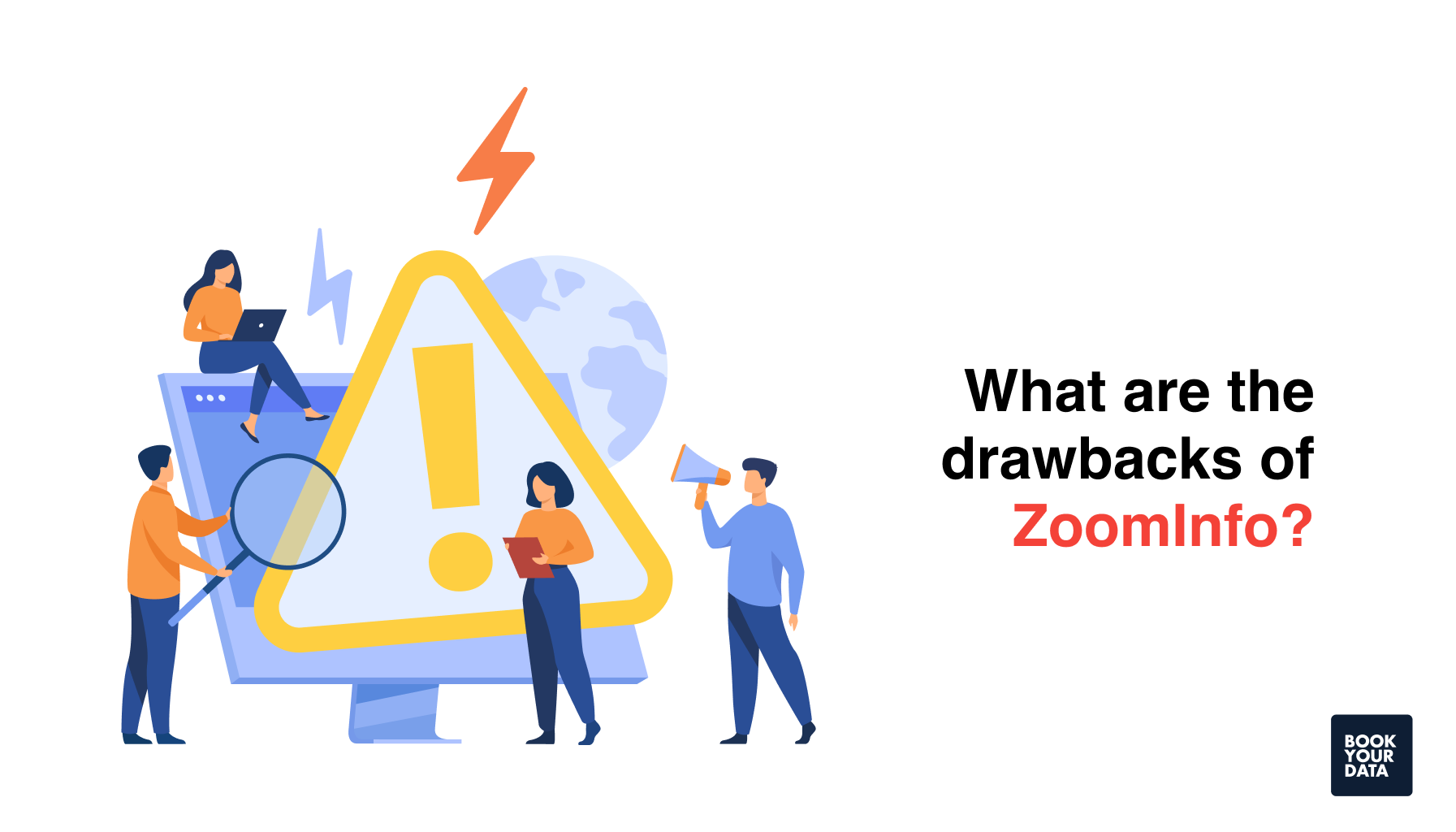
The drawbacks of ZoomInfo are high costs, a steep learning curve, data accuracy issues, and complex integration, which are not beneficial for all types of businesses.
The drawbacks of ZoomInfo are listed below.
- High costs: ZoomInfo's pricing starts at $14,995 per year, which is costly for small businesses or startups. Its other higher tiers are even more expensive and not budget-friendly for growing businesses.
- Steep learning curve: ZoomInfo’s interface is overwhelming for new users with numerous features and filters that require extensive training to operate. This complexity delays the system’s adoption and reduces its value for businesses that need easy and quick results.
- Potential data accuracy issues: ZoomInfo provides a very large database, but it is not always accurate. Many users report outdated or incorrect contact information, such as wrong email addresses or phone numbers, which wastes time and effort.
- Complex integration workflows: ZoomInfo’s intelligence system integrates with tools like Salesforce or HubSpot, which require technical assistance. It becomes challenging to put extra effort into maintaining data flow, which slows down teams’ overall efficiency.
- Limited international coverage: ZoomInfo performs well in North American markets but has limited coverage in international markets. Businesses that aim to reach global audiences find gaps in the data for some regions or countries, such as EMEA (Europe, the Middle East, and Africa) or APAC (Asia-Pacific).
- Limited customization in lower-tier plans: ZoomInfo’s lower-tier plans offer limited customization options, such as custom filters, detailed analytics, and integration options, which restrict customization for specific business needs.
- Customer support challenges: Some ZoomInfo users report slow response times and unhelpful support when addressing billing disputes or technical issues. This lack of responsiveness is a significant drawback for a premium-priced tool.
- Lack of native outreach tools: ZoomInfo doesn't offer native outreach tools, and users must integrate with external platforms like Outreach, Salesloft, or Apollo to set up email or LinkedIn cadences, which adds to the complexity of the workflow and financial burden.
What are the benefits of Salesgenie?
The benefits of Salesgenie are its accurate and updated contact data, advanced targeting capabilities, automated outreach, and CRM integration.
The benefits of Salesgenie are listed below.
- Accurate and updated contact data: Salesgenie offers a vast database of more than 19.5 million verified businesses and 255 million individual consumers. The database updates more than 300 attributes weekly to make sure that users have access to the most current and accurate contact information available.
- Targeted lead generation: The platform allows users to build highly targeted lead lists by filtering contacts based on various criteria such as industry, location, income, ZIP code, and age, to allow businesses to focus their strategies on the most promising prospects.
- Reporting tools for insights: Salesgenie offers reporting tools that allow users to track every call, email, and note, which provide insight into team activity, lead progress, and overall performance to help businesses make smarter, data-driven decisions.
- Website visitor identification: The business intelligence platform includes features that help businesses to identify and track website visitors, which provides valuable insights into potential leads and allows more personalized and timely prospect outreach.
- Alert on key prospect actions: Salesgenie provides real-time notifications when prospects show strong buying signals, which allows sales teams to prioritize their efforts and engage with leads at the optimal time.
- Automated outreach and CRM updation: Salesgenie allows users to automate email campaigns and direct mail to streamline outreach efforts. It also synchronizes contact details, call notes, and activity history with the company’s CRM, to make sure that all information is up to date.
- Training and support: Salesgenie offers a Resource Center with access to webinars, articles, and tutorials, and customer support services to help users benefit from the platform's capabilities and achieve their sales goals.
- Integration with major CRMs: Salesgenie integrates with popular CRM systems like Salesforce, HubSpot, and Microsoft Dynamics, which keeps all lead and customer data synchronized across platforms. This feature reduces manual data entry and improves efficiency.
- Sales growth: Salesgenie helps businesses identify and connect with high-quality leads, which leads to increased sales opportunities and revenue growth.
- Mobile accessibility: The Salesgenie mobile app allows users to manage leads on the go, with features like location-based searches, lead tagging, and routing maps, which are beneficial for field sales teams.
What are the drawbacks of Salesgenie?
The drawbacks of Salesgenie are related to data accuracy, pricing structure, and limited advanced features.
The drawbacks of Salesgenie are listed below.
- Data Accuracy Issues: Salesgenie users have reported outdated and incorrect contact information, such as wrong email addresses or phone numbers, which leads to wasted time and effort.
- High Costs for Additional Leads: The pricing plans of Salesgenie provide access to a selected number of leads, and exceeding that limit results in extra charges, which is not budget-friendly for large B2B lists.
- Limited Advanced Features: Salesgenie lacks some of the more advanced analytics and segmentation tools, such as AI-driven insights and automated behavior-based targeting, which limits its effectiveness for data-driven sales strategies.
- Basic Filtering Options: Some users of Salesgenie report the filtering capabilities to be basic, which makes it challenging to manage long lead lists and accurately target prospects.
- No API Access in Lower-Tier Plans: Salesgenie’s basic plan lacks API access, which limits the ability to integrate Salesgenie data with other systems for workflow automation.
- No Email Verification: The lower-tier plan does not include email verification services, which can lead to higher bounce rates and reduced effectiveness of outreach campaigns.
- Limited Integrations: The Salesgenie system integrates with basic CRMs like Salesforce, Hubspot, and Microsoft Dynamics only, which delays campaign and outreach workflows because of manual data entries.
What is ZoomInfo's database quality?
The database quality of ZoomInfo is highly reliable since it maintains a minimum 95% accuracy through a multi-layered approach that combines automated web crawling, manual verification, and a dedicated research team. The B2B sales intelligence platform uses custom web crawlers to scan millions of online sources daily. It collaborates with trusted data partners, leverages contributions from its users, and gathers data from public records and other online sources. The collected data is then processed using machine learning algorithms to assign a data quality score to each contact record, which indicates its predicted accuracy.
A large human review team conducts manual verification to confirm the reliability of the information. ZoomInfo claims a high accuracy rate for its contact and company data, with 75%-99% accuracy. Some users experienced outdated or incorrect information and have reported varying levels of data quality in non-U.S. markets and for small-to-medium-sized businesses. ZoomInfo continuously updates its database and encourages users to report inaccuracies, which contributes to the ongoing improvement of data quality.
What is Salesgenie's database quality?
The database quality of Salesgenie is high and satisfies customers, as the platform invests millions annually to maintain it. Salesgenie dedicates hundreds of full-time researchers to continuously update its business and consumer records. The sales lead building platform sources its information from reputable publicly available sources, which include utility connections, press releases, annual reports, corporate websites, and verified business directories.
Salesgenie cleans the acquired data by making verification calls each year to maintain its accuracy and freshness. Salesgenie offers a satisfaction guarantee and refunds customers for any undeliverable, outdated, or disconnected data. Salesgenie also provides data hygiene services such as list updates, postal processing, data suppression, and merge/purge to improve the cleanliness and accuracy of customer data files.
What are the pricing plans of ZoomInfo?
The pricing plans of ZoomInfo include Lite, Professional, Advanced, and Elite, where each plan is customized based on the selected subscription plan, the number of users, credits, and any additional add-ons.
The pricing plans of ZoomInfo are listed below.
- Lite plan: ZoomInfo offers a free program with limited access to its database in exchange for users’ business data. This free plan allows users to download 10 contacts per month.
- Professional Plan: This starting plan is priced at $14,995 per year, which includes 5,000 annual bulk credits, and additional users cost $1,500 each.
- Advanced Plan: The Advanced plan costs $24,995 annually and comes with 10,000 annual bulk credits and 1,000 monthly credits per user. Additional users are billed at $2,500 each for larger teams.
- Elite Plan: The Elite plan costs $39,995 per year and provides 10,000 annual bulk credits with 1,000 monthly credits per user. It offers the most comprehensive set of features and add-ons compared to the other plans.
What are the pricing plans of Salesgenie?
The pricing plans of Salesgenie include Basic, Pro, and Team, and these plans are subscription-based and designed to serve businesses of different sizes and prospecting needs.
The pricing plans of Salesgenie are listed below.
- Basic Plan: This entry-level plan costs $99 per month and provides access to a limited number of leads, basic filtering options, and standard email campaign tools.
- Pro Plan: Salesgenie’s Pro plan is priced at $149 per month, which includes more leads per month, enhanced segmentation capabilities, and support for CRM integration to streamline sales workflows.
- Team Plan: Salesgenie offers a Team plan at $299 per month and features custom solutions, multi-user support, regular data refreshes, and API access for advanced integrations and team collaboration.
What is the best alternative to ZoomInfo and Salesgenie?

BookYourData is the best alternative to ZoomInfo and Salesgenie because it is affordable, reliable, and flexible for businesses of all sizes. BookYourData is one of those Salesgenie competitors that offers access to over 250 million verified B2B contacts worldwide with a guaranteed 97% accuracy. It operates on a flexible pay-as-you-go model with no long-term contracts, which makes BookYourData one of the best ZoomInfo competitors in terms of pricing. BookYourData users utilize more than 100 advanced filters, which include industry, job title, company size, revenue, geography, and technographics for precise lead building. BookYourData provides global data coverage across the U.S. and Europe, which supports international sales and marketing initiatives.

G2 comparison for BookYourData, ZoomInfo, and Salesgenie
The G2 comparison of BookYourData, ZoomInfo, and Salesgenie provides a general comparison and ratings of their features. BookYourData stands out in key metrics with higher ratings in meeting user requirements, ease of use and setup, performance, and quality.
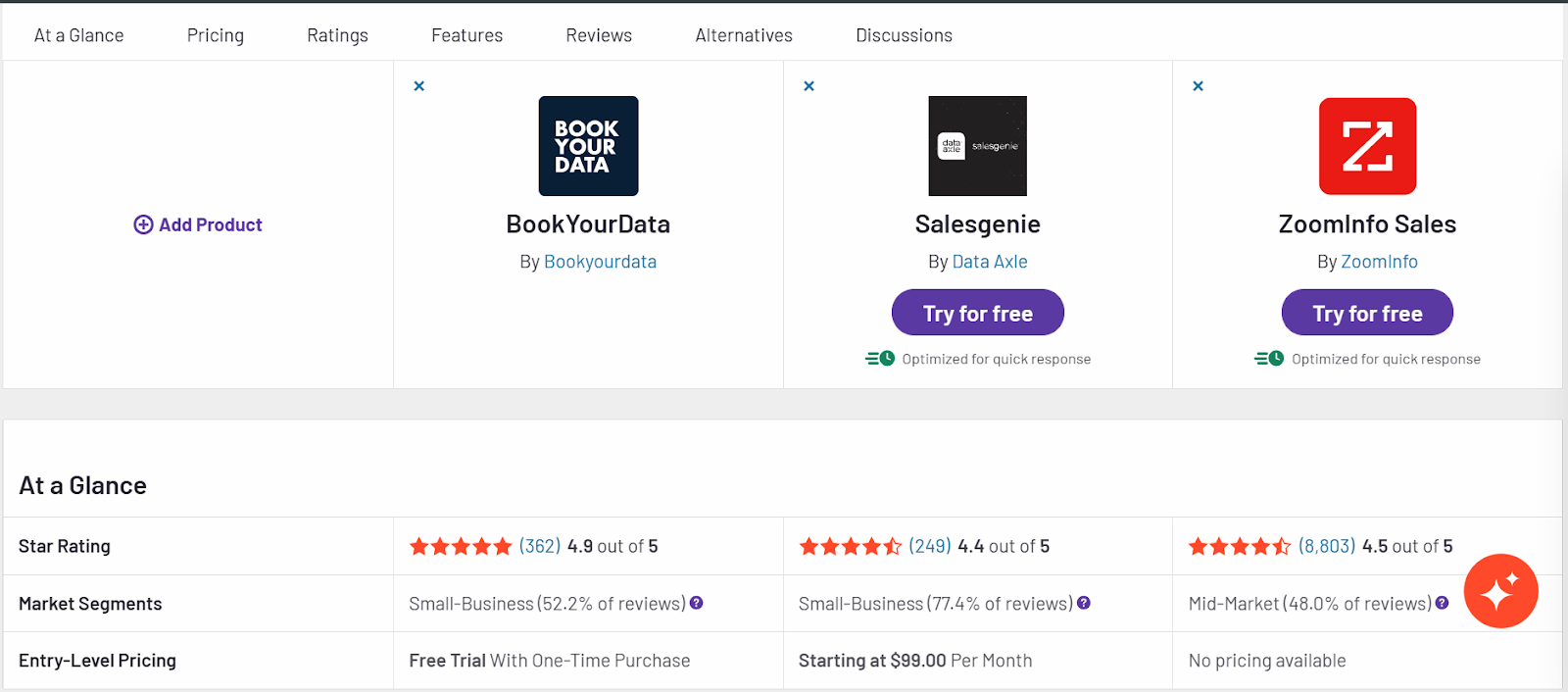


Source: https://www.g2.com/compare/bookyourdata-vs-salesgenie-vs-zoominfo-sales
ZoomInfo vs. Salesgenie: Which one should you choose?
The factors businesses should consider when choosing between ZoomInfo and Salesgenie are company size, lead generation needs, budget, integration requirements, and data coverage.
Determine the size of your organization before selecting a platform, as large enterprises that require advanced sales intelligence, technographics, and intent data will benefit from ZoomInfo, while Salesgenie is best for small to mid-sized businesses with more straightforward prospecting needs.
Identify how many contacts and leads sales and marketing teams require for outreach. ZoomInfo provides high-volume, verified global B2B contacts with automated enrichment, whereas Salesgenie offers U.S.-focused business and consumer leads with flexible monthly plans.
Analyze prospecting volume with the platform’s capabilities to ensure efficiency and cost-effectiveness. Compare ZoomInfo’s annual plans, which start at $14,995, to Salesgenie's tiered monthly subscriptions starting at $149. Consider ROI and make sure the platform matches outreach goals without overspending.
Evaluate integration requirements with CRMs and marketing automation tools. ZoomInfo supports a wide range of systems like Salesforce, HubSpot, Marketo, and Outreach for easy enterprise workflows, whereas Salesgenie focuses on core CRM integrations suitable for smaller teams.
Review data coverage and compliance, because ZoomInfo offers global B2B data and advanced analytics, while Salesgenie provides U.S. business and consumer data with regularly updated records. Make sure the chosen platform aligns with your marketing regions and compliance needs to reduce risk and improve campaign accuracy.
Is Salesgenie good for verified leads?
Yes, Salesgenie is good for verified leads, as it offers a large database of business and consumer contacts that are regularly validated by researchers and data maintenance processes. It provides reliable leads for small to mid-sized businesses that run targeted outreach and consumer marketing campaigns.
Is ZoomInfo more affordable than Salesgenie?
No, ZoomInfo is not more affordable than Salesgenie and offers annual subscriptions starting at $14,995 because it provides advanced B2B data, AI-powered intent signals, and deep integrations for enterprises. Salesgenie offers simple tiered pricing and focuses on easy accessibility, which is more budget-friendly for smaller businesses with limited resources.
Can ZoomInfo enrich CRM contacts?
Yes, ZoomInfo enriches CRM contacts using data enrichment features that automatically fill missing fields, update outdated contact information, and add technographic or firmographic details to CRM records. This data enrichment guarantees that sales and marketing teams always operate on accurate and complete customer data.
What are the differences between ZoomInfo and BookYourData?
The differences between ZoomInfo and BookYourData are that ZoomInfo is a comprehensive B2B intelligence platform with advanced features like intent data, technographics, and CRM integrations, while BookYourData is a user-friendly contact database that offers direct list purchases with real-time data.
Does ZoomInfo include technographic data?
Yes, ZoomInfo includes technographic data that shows a company’s software, tools, and IT infrastructure. This data helps sales teams to identify competitive opportunities, acquire prospects, and build personalized account-based marketing strategies.
Can Salesgenie support direct mail campaigns?
Yes, Salesgenie supports direct mail campaigns as a built-in feature, which allows businesses to create and send postcards, letters, or brochures to targeted consumers and business personnel directly from the platform.
What are the differences between Salesgenie and BookYourData?
The differences between Salesgenie and BookYourData are that Salesgenie offers both business and consumer data, with built-in campaign execution tools like email and direct mail, while BookYourData is a lead generation platform that provides verified business contact lists in seconds. Salesgenie offers tiered monthly subscriptions while BookYourData uses a pay-as-you-go pricing model, which is more flexible and budget-friendly.
Does Salesgenie offer AI sales tools?
No, Salesgenie does not offer AI sales tools for prospecting as its main focus is on data access and campaign execution, but it offers predictive filters based on firmographic and demographic data to help prioritize leads.
Is ZoomInfo AI-powered?
Yes, ZoomInfo is AI-powered and applies machine learning and natural language processing to verify data, detect intent signals, and provide predictive insights. This helps businesses prioritize prospects more effectively and improve campaign timing.
Can I export contacts from Salesgenie?
Yes, you can export contacts from Salesgenie, as it allows users to export contacts and lead lists into formats suitable for CRM systems or external tools. Export limits vary depending on the selected subscription plan.
Is Salesgenie better for small businesses?
Yes, Salesgenie is better for small businesses due to its user-friendly design, consumer database access, and affordable plans. It provides practical tools for lead generation and outreach without requiring complex training or enterprise-level budgets.
Does ZoomInfo support ABM?
Yes. ZoomInfo supports ABM (account-based marketing) by providing firmographic and technographic insights, organizational hierarchies, and intent signals. These features allow marketing and sales teams to coordinate targeted, personalized campaigns for high-value accounts.
[CTA1]
[CTA2]

